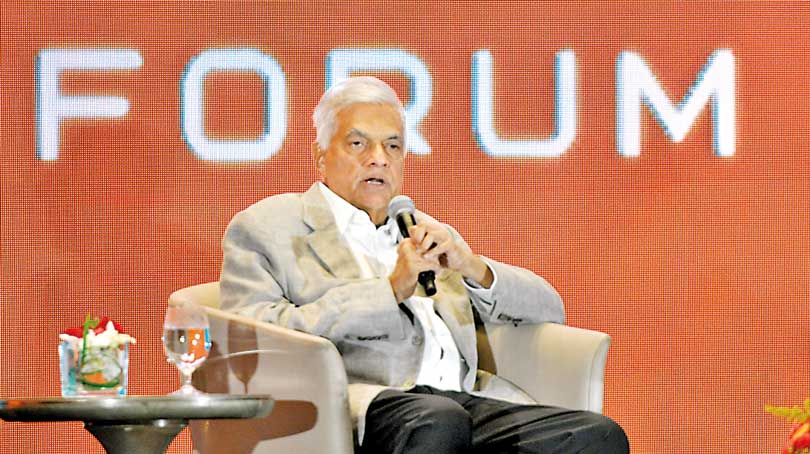Tuesday Feb 17, 2026
Tuesday Feb 17, 2026
Tuesday, 3 September 2024 02:03 - - {{hitsCtrl.values.hits}}

President Ranil Wickremesinghe – Pic by Lasantha Kumara
By Charumini de Silva
President Ranil Wickreme-singhe last night reassured the professional and the business community of steering the country for economic success in the next five years.
During the ‘Ask Me Anything’ special Q&A session organised by The Professionals Forum at Shangri La yesterday, Wickremesinghe reiterated his commitment to economic stability, growth and prosperity for people.
The President said he was content with two key factors of economic stability and creating an environment to hold an election in the country. “I am proud to be overseeing elections, where race, religion and caste do not matter — only election does,” he added.
He pointed out that governance should not be personalised around the Executive, suggesting that discussion on governance should not overshadow pressing economic needs.
”We have spent over 30 years debating the abolition of the Executive Presidency. My priority is stabilising and boosting the economy. I think the governance reforms should be secondary. Therefore, improving the economy is my immediate priority because without a stable economy, achieving good governance is impossible,” he said.
Responding to questions about international bondholders, the President clarified that there was no immediate ultimatum. “Negotiations are ongoing and I cannot disclose details. But there is no ultimatum as such, as everyone knows there is an election here,” he added.
Wickremesinghe also said that irrespective of the team that he has to work with, his priority is on working effectively with them. “That team (Parliamentarians) has to be elected by the public and then the Prime Minister will be appointed based on who has the majority support in the Parliament,” he quipped adding he won’t choose his own Cabinet but will appoint Ministers based on those elected by the people to Parliament.
With regards to the backlog of passport applications, Wickremesinghe assured the public that the Government is working to transition from conventional passports to more secure e-passports. “We apologise for the delays and are committed to completing the transition by October,” he assured.
Addressing questions on the lengthy approval process faced by investors, the President announced that from 1 January 2025, a new Economic Commission would be established under the Economic Transformation Act. “This Commission will act as a single point of contact for investors,” he stated.
In terms of tackling corruption, Wickremesinghe acknowledged its pervasive nature and the need for effective measures and revealed plans to implement an anti-corruption agenda, developed in consultation with the IMF.
“This system will be one of the strongest anti-corruption frameworks in South Asia. It would involve new legislation to address legal loopholes and hold corrupt officials accountable, including the removal of corrupt Members of Parliament,” he said.
The President also detailed plans for a Rs. 50 billion fund to help struggling SMEs and MSMEs, whilst noting the introduction of a new insolvency law to allow these businesses to restructure and recover from financial distress. “Our goal is to enable as many SMEs and MSMEs as possible to operate effectively. We will also establish a National Development Bank to further support these businesses, but it needs a good network of branches covering the entire country,” he said, adding that these would be supplemented by the consolidation of various support agencies under the ‘Enterprise Sri Lanka’ initiative.
In response to digital initiatives, the President highlighted the Government’s focus on digital transformation across various sectors. “We are prioritising the digitalisation of Government services, including Immigration, and aiming to complete this within five years,” he stated.